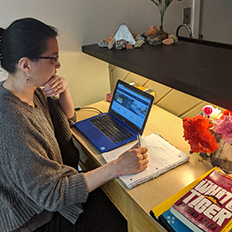
Joy Ochs
Professor of English
MMU: With the shift from face-to-face classes to online classes, how did you go about turning your curriculum to fit the online format?
JO: The key is to be adaptable to what each group of students needs. For discussion-based courses, I know that students value being able to interact with each other, so I use live chats on Slack. For courses where it makes more sense for students to read at their own pace, I post short video lectures and asynchronous discussions.
MMU: What is the biggest challenge you are facing with teaching virtually?
JO: It’s difficult not being able to interact with students face to face. I take a lot of cues from students – body language, facial expressions, raised hands – and adjust my teaching as I go if I see they don’t understand something. Online, it feels a bit like flying blind. Students, definitely reach out to your professors to let them know if you are “getting it” or need the material to be adjusted for you.
MMU: Walk us through your new routine.
JO: I couldn’t function without separate “work” and “home” spaces in my house. I have set up a new work space away from everything in my basement. I only work when I’m there, and try to be present for my family when I’m not there. Typical day: 9 a.m. go to “work.” Answer emails and chat with students. Prepare new assignments that work better in the online format. Respond to student work (“grading” student work doesn’t feel right under the circumstances). At noon I go upstairs for lunch and a break. 1:00 back to work for my afternoon courses. Handle any administrative work I have to do. Email colleagues. Record video lectures for the next day. Check in with students one more time.
MMU: Do you miss your students? What are you doing to stay connected with them?
JO: Most of my students are doing an awesome job of staying connected, so I don’t miss them as much as I thought I would. But I do grieve for my students, because I know how much they’ve had to give up: lost sports seasons, performances, graduation, living on campus, and the normal routine of being a student. I do not recommend teaching while heartbroken.
I also think about alumni. A lot of students I have taught in the past are now nurses and medical professionals. I’m so grateful to them for the work they are doing.
I normally keep my social media separate from my professional role, but I just friended about 50 students – everyone I could find on Facebook!
MMU: What are you doing to keep yourself busy, when you aren’t grading, teaching, etc.?
JO: My husband teaches at Kirkwood and both our daughters are home from their universities, so we’ve been busy setting up 4 separate work stations so we can each concentrate on what we have to do. That has led to a lot of furniture rearranging and house cleaning!
My sister and brother-in-law both work at the CDC. They are working from home on the pandemic response, so I help with their essential work by Zooming with their three children for an hour every day. We call it Auntie Joy’s one-room school. We discuss books, biology, history, geology, and art.
To wind down I work on jigsaw puzzles, write letters to friends, and do a lot of birdwatching
MMU: What has this experience taught you about yourself and/or your students?
JO: I have seen so much compassion from everyone I work with. I have seen students and colleagues rise to the occasion. We really are more resilient than we think. This crisis is revealing weaknesses in our social systems, and I believe we have the opportunity to learn from these mistakes and make positive changes. Mount Mercy students can be in the forefront of that.
MMU: Do you have any advice for students/coworkers/MMU community members as we navigate through this?
JO: It’s okay to feel negative emotions; allow yourself to process them. Keep a journal; we’re living through history right now. Be brave. Wash your hands.